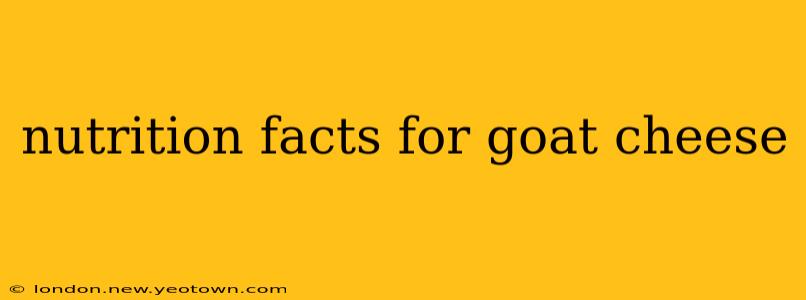Decoding the Deliciousness: A Deep Dive into Goat Cheese Nutrition
Goat cheese, with its tangy flavor and creamy texture, has charmed palates for centuries. But beyond its delightful taste lies a nutritional profile worth exploring. This isn't just a simple "nutrition facts" rundown; we'll delve into the specifics, answering common questions and uncovering the hidden nutritional gems within this delightful dairy product.
Imagine this: you're crafting a gourmet salad, the vibrant greens glistening under a drizzle of olive oil. A dollop of creamy goat cheese sits atop, adding a burst of salty tang that perfectly complements the fresh ingredients. That simple addition brings more than just flavor; it contributes a surprising array of nutrients to your meal.
Let's unravel the nutritional secrets of goat cheese, addressing some common queries along the way.
What are the nutritional benefits of goat cheese?
Goat cheese is a powerhouse of nutrients, offering a good source of protein, calcium, and several essential vitamins and minerals. Compared to cow's milk cheese, goat cheese often boasts a higher concentration of certain nutrients, particularly short-chain fatty acids, which can contribute to gut health. The specific nutritional content can vary depending on factors such as the type of goat milk used, the aging process, and any added ingredients. However, generally, you can expect a serving of goat cheese to provide:
- Protein: Essential for building and repairing tissues.
- Calcium: Crucial for strong bones and teeth.
- Vitamin A: Supports vision and immune function.
- Vitamin B12: Important for nerve function and red blood cell formation.
- Riboflavin (B2): Contributes to energy metabolism.
- Conjugated Linoleic Acid (CLA): A fatty acid with potential health benefits.
Remember, moderation is key! While goat cheese offers many benefits, it's also higher in fat and calories than some other dairy options.
How much fat and protein is in goat cheese?
The fat and protein content in goat cheese vary depending on the type and preparation. Soft goat cheeses generally have a higher fat content than harder, aged varieties. As a general guideline, a typical ounce (approximately 28 grams) of goat cheese contains around 5-8 grams of protein and 7-10 grams of fat. This fat is primarily saturated fat, so it's important to consume goat cheese in moderation as part of a balanced diet. The fat content contributes to the rich, creamy texture that many people love.
Is goat cheese good for weight loss?
This is a common question, and the answer isn't a simple yes or no. While goat cheese offers protein, which can aid in satiety and help you feel fuller for longer, it is also relatively high in calories and fat. Therefore, incorporating goat cheese into a weight-loss diet requires mindful consumption. Small portions, as part of a balanced meal, are key. Choosing lower-fat varieties can also help manage calorie intake.
What are the differences between goat cheese and cow's milk cheese?
While both are excellent sources of calcium and protein, key differences exist. Goat cheese often has a tangier, more distinct flavor. It's also typically easier to digest for some individuals who have trouble processing cow's milk. Furthermore, the fat profile differs slightly, with goat cheese sometimes containing higher levels of certain fatty acids beneficial for gut health.
What are the potential health risks associated with eating goat cheese?
Generally, goat cheese is safe for consumption. However, individuals with lactose intolerance might experience digestive discomfort. Furthermore, as with any dairy product, the risk of listeria contamination exists, though this is generally low with properly handled and stored cheese. Always check the expiration date and ensure the cheese is refrigerated correctly.
Conclusion:
Goat cheese offers a delightful blend of flavor and nutritional value. Its rich texture and tangy taste add a unique element to various dishes. However, remember to enjoy it mindfully as part of a balanced diet. Understanding its nutritional profile empowers you to make informed choices and incorporate this delicious cheese into your culinary creations while prioritizing your health.

